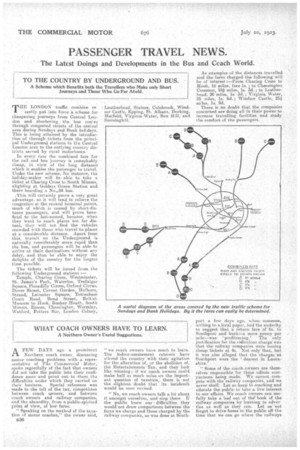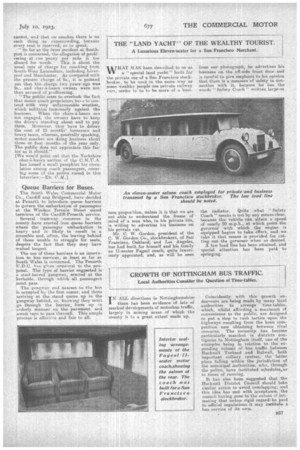WHAT COACH OWNERS HAVE TO • LEARN.
Page 20

Page 21

If you've noticed an error in this article please click here to report it so we can fix it.
A Northern Owner's Useful Suggestions. _
AFEW DAYS ago a prominent Northern coach owner. discussing motor coaching problems with a representative of The Commercial Met at', spoke regretfully of the fact that owners did not. take the public into their confidence more and point out to them the difficulties under which they carried on
their business. Special reference was made to the toll of the tax, competition between coach ciwneri, and between coach owners and railway companies, and the absurdity, from a public-spirited point of view, of low fares.
" Speaking on the method of the taxation of motor coaches,". the owner said, E36
"we coach owners .have much to learn. The indoor-amusement caterers have stirred the country with their agitation for the alteration of, or the abolition of, the Entertainments Tax, and they look like winning; if we coach owners could make half as much noise on the important question of taxation, there, is not the slightest 'doubt that its incidenc'e would be soon revised.
" No, we coach owners talk a lot about it, amongst ourselves, and, stop there Ti the public knew our difficulties they would not draw e,omparisions between the fares we charge and those charged by the railway companies, as was done at South.
port. a few days ago, when someone, writing to a local paper', had the audacity to suggest that. a return fare of 6s. to Southport and hapk-La mere penny per rnile-Was'profiteering.' The only justification for the rielictilous charge. was that the railway companies were issuing cheap tickets at 4s. Not only that, but it was also alleged that the charges at Southport were the dearest in Lancashire.'
" Some Of the coach owners are themselves responsible for these odious comparisons being made. We cannot COMpete with the railway companies, and we never shall. Let us keep to coaching and educate the public to take a live interest in our affairs. We coach owners can, usefully take a: leaf out of the' book of the railway companies by learning to advertise aswell as they can. Let us .not. forget to drive home to the public all the time that We can go where the railways cannot, a.n..1 that on coaches there is no such thing as overcrowding, because every seat is reserved, so to speak.
" So far as the fares incident at Southport is concerned, the allegation of profiteering at one penny per mile is too
absurd for words. This is about the usual rate of charge for coaching from South-West Lancashire, including Liverpool and Manchester. As compared with the present charge of 6s., it is pointed Out that the charge two years ago was 9s., and char-h-banes owners were not then accused of profiteering. "The public seem to overlook the fact that motor coach proprietors hal. e to contend with very unfavourable weather, which militates immensely against the business. When the chars-a-banes are not engaged, the owners have to keep the drivers standing about and to pay them. Moreover, they have to defray the cost of 12 months' inktuanee and heavy taxes, whereas, generally speaking, motor coaches are doing business about three or four months of the year only. The public does not appreciate this factor as it should."
1We wou!d point out that the Yorkshire char-a-banes section of the C.M.U.A. has issued a small pamphlet for circulation among coach passengers, covering some of the points raised in this interview.—En. C.A.(.]
Queue Barriers for Buses.
The South Wales Commercial Motor Co., Cardiff and Dridgend, have decided at Penarth to introduce queue barriers to govern the embarkation of passengers at the Windsor Terrace Street stand terminus of the Cardiff-Penarth service.
Several tramway concerns in the county have erected iron queue barriers where the passenger embarkation is heavy and is likely to result in a Scramble and, often, the leaving 'behind of those unable to struggle for seats, despite the fact that they may have wasted longest.
The use of these barriers is an innovation to bus services, at least so far as South Wales is concerned. The Penarth U.D.C. has given anproval to the proposal. The type of barrier suggested is a steel-barred gangway, erected at the kerbside, through which all passengers must pass.
The gangway end nearest to the bus is occupied by the first corner, and those arriving at the stand queue up in the gangway behind, or, knowing they must go through the barrier, form up in orderly manner on the pavement and await turn to pass through. This simple process is effective and fair to all.




























